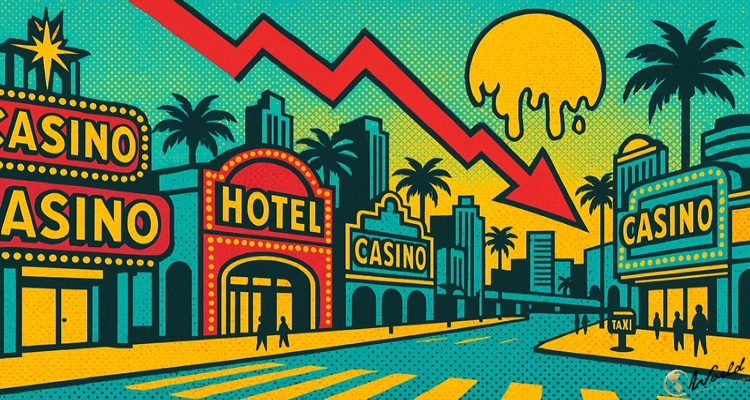The slowdown in Southern Nevada tourism is rippling across the Las Vegas Strip, and even The Strat — one of its most iconic properties — has not been spared. Golden Entertainment, which operates the resort, reported a dip in both revenue and occupancy during the second quarter, reflecting a broader softening in visitor demand.
Prices and Perceptions Shape Visitor Behavior
In its latest earnings call, the company disclosed that The Strat’s hotel occupancy averaged 69% for the quarter, down from 73% a year ago. The drop was more pronounced in June, when occupancy slid to 60% compared with 76% in the same month of 2024. Company president and CFO Charles Protell noted that weakness on the Strip extended into July but said bookings have begun to stabilize in August. Golden expects stronger demand to return later in the year as group events and conventions fill the calendar.
Golden operates eight casinos in Nevada and 72 gaming taverns under brands such as PT’s, Sierra Gold, and Lucky’s. Revenue for the quarter reached $164 million, a 3% year-over-year decline, with operating income slipping from $13.5 million to $11.9 million. The Nevada casino resorts segment generated $98 million, down from $101 million last year, a change the company attributes to lower Strip visitation and a poor table games hold in Laughlin.
Weekend business at The Strat remains healthy, often exceeding 90% occupancy, but weekday performance lags. To adjust, Golden has scaled back certain amenities on slower days, with some restaurants closing midweek. Protell explained that the company has “aggressively managed costs to mitigate the impact of lower revenue” during the quarter.
Locals and visitors alike point to pricing as a major factor in the decline. Las Vegas resident Regina Knight expressed frustration over rising costs, saying, “There’s no likelihood. It’s too expensive. Everything. Fees. Everything. It’s too expensive.” She recalled visiting in earlier years when prices were more affordable, but now finds the city unaffordable even as a local.
Data from the Las Vegas Convention and Visitors Authority (LVCVA) shows the average Strip room rate in June at $174, with downtown at $87 — both slightly lower than last year, including a nearly 7% drop on the Strip. Still, experts say revenue management strategies keep rates fluctuating sharply. Alan Feldman of UNLV’s International Gaming Institute likened pricing to “a grease pole” that is constantly changing, adding that big resorts rely on analytics and artificial intelligence to adjust prices rapidly.
Economist Mike PeQueen said major resorts appear to be shifting toward higher-end offerings, making luxury accommodations more common. “Who on earth ever heard of spending six or $700 a night for hotel room in Las Vegas? That was ridiculous. Well, that was before there was Bellagio and Palazzo and Aria and others,” he said.
Economic Signals Beyond the Strip
Las Vegas saw 3.1 million visitors in June, but that was still down 11.3% — nearly 400,000 fewer than the same month in 2024. The downturn has persisted for six consecutive months, raising questions about broader economic trends. LVCVA’s report cited “persistent economic uncertainty and weaker consumer confidence” as key factors.
Air travel into Harry Reid International Airport fell by about 318,000 passengers in June, with drops in both domestic and international traffic. Road travel also slowed, with I-15 border traffic from California down 4.3%.
International visitation, particularly from Canada, has taken a notable hit. Andrew Woods of UNLV’s Center for Business and Economic Research pointed to the impact of U.S. tariffs and strained cross-border relations as a reason for fewer Canadian tourists. Other analysts note that stricter visa requirements and airport scrutiny are deterring travelers from multiple regions.
Despite these headwinds, gambling revenue in June was slightly higher than last year, and convention attendance remains ahead of 2024’s pace. Analysts such as Oliver Lovat believe some visitors may be delaying trips until major upcoming events, including the Formula 1 Grand Prix and the 2026 FIFA World Cup.
Golden Entertainment is also looking ahead to potential economic boosts in 2026 from Nevada’s recently approved tax relief on tips and senior deductions. According to the Las Vegas Review-Journal, CEO Blake Sartini said these changes could strengthen local spending, benefiting both its casinos and taverns. “We see a very positive outlook continuing for the local economy,” he said.


